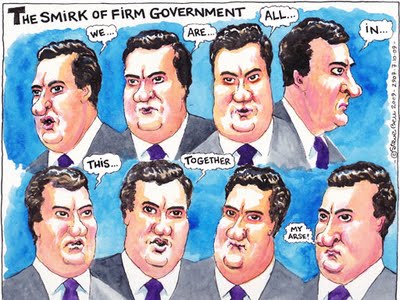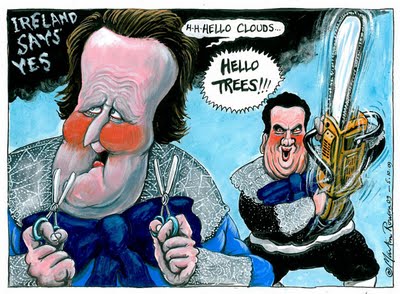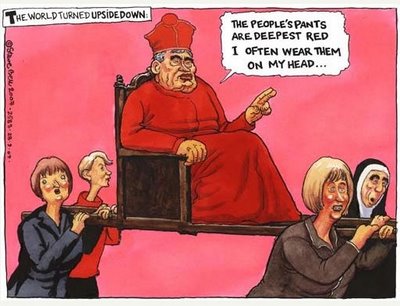Ready for the same old dishonesty.
 Like Craig Murray, I had to wonder whether I was on the same planet yesterday as some of the hacks who were clearly incredibly close to falling in love with George Osborne and his "massive electoral gamble", as Nick Robinson put it. Robinson was so over the top in his clear adoration of Osborne on the 10 O'Clock News that the only thing he didn't do was film himself shooting off while listening to the speech as a result of his excitement. If the BBC turned over and fell for New Labour, then the same seems to be happening now that the Tories are on the way in. Even the Graun described Osborne's gambit as their biggest political gamble in a generation.
Like Craig Murray, I had to wonder whether I was on the same planet yesterday as some of the hacks who were clearly incredibly close to falling in love with George Osborne and his "massive electoral gamble", as Nick Robinson put it. Robinson was so over the top in his clear adoration of Osborne on the 10 O'Clock News that the only thing he didn't do was film himself shooting off while listening to the speech as a result of his excitement. If the BBC turned over and fell for New Labour, then the same seems to be happening now that the Tories are on the way in. Even the Graun described Osborne's gambit as their biggest political gamble in a generation.Osborne's explanation of just what his new and doubtless "tough and tender" interpretation of austerity will entail left as many questions as it did answers. To start with, this is a very funny sort of austerity: let's accept for a second that the cuts and wage freezes which Osborne announced yesterday result in the £7 billion saving which he claims they will. Undoubtedly, these cuts will cause suffering, and they fall mainly on the middle, which is usually anathema to his party. All the same, this is as Robert Chote described it, nothing more than a dent in the actual deficit. Over a parliament it should save £35 billion. This year alone we've already borrowed over £175 billion. This isn't even going to begin to cut the deficit by half by 2014, as Labour have promised, with the Tories, although not being specific, saying they will act faster.
This therefore fails Osborne's own honesty test. He might not have said that these are going to be the only cuts, and he hasn't specifically ruled out tax rises, but many will get the impression that this will be the Tories' main prospectus for bringing down the deficit. Instead, this will only be the very, very beginning, as the Tories themselves must know if they are serious about reducing the deficit, and considering that it now seems to be their only real economic policy, it seems safe to assume that they are. Nick Clegg might have regretted talking about "savage cuts", but it's the closest description to what can be expected will be the order of the day once the Tories do seize the reins of power.
For this was just as fantastical a speech and lacking in any real integrity as Gordon Brown's was last week. Does anyone seriously believe that Osborne's repeated dirge that "we're all in this together"? I didn't even watch the speech in full, but the number of times he repeated the ridiculous phrase left me wanting to cram it down his throat. Indeed, it's fantastically clear from the very policies promised that we're not all in this together. Magnanimously, Osborne decided that he couldn't possibly repeal the 50p tax band for those earning over £150,000 a year while we're in the current mess, he's had to put the inheritance tax threshold raise on the backburner, although it's still a commitment during their first term, and if the bankers continue to award themselves ludicrous bonuses, he will step in to tax them, but apart from that there was nothing here that would shift the burden of bringing down the deficit to those who got us into this mess from those at both the bottom and the middle. Anyone earning over £18,000 in the public sector will have a year's pay freeze. The full-time median wage is £25,123. What is interesting is what both the Tories and Labour are prioritising: the military will not have to undergo any such pay restraint, meaning that if you're trained to kill people rather than trained to save people you're currently the more highly valued. To go off on a tangent for a second, it's also instructive that no party has considered getting out of Afghanistan to save money, but then that sort of thinking would make too much sense.
Just to highlight further how we're not all in this together, it's hard not to detect something afoot in the demand that no one in the public sector should earn more than the prime minister. Fair enough, but why not extend it completely? After all, just who is exactly worth more than just under £200,000 a year? Clearly, no one should earn more than David Cameron will, and if anyone suggests this isn't about all making a contribution and rather about envy, which is of course a Labour trait, then the Bullingdon might be paying you a visit.
Not everything that Osborne proposed was instantly objectionable. I'm one of those lefties who believes that only those who need the state's help should get it: why on earth were those earning over £50,000 a year getting tax credits in the first place when those at the bottom could have been receiving more (indeed, tax credits have always seemed a poor alternative to a guaranteed citizen's basic income and taking the lowest paid out of tax altogether)? I'm not as certain on the abolition of the child trust funds for all but the poorest third, as anything that encourages saving is welcome, but it may well be one of those cuts which we have to accept in the circumstances.
Most offensive is just the sheer disingenuousness of most of the speech. Osborne complains at one point that all Labour did last week was announce yet more spending; Osborne's party would never be so crass in committing to spending increases and tax cuts at a time when the books are so in the red. All they're doing is reversing Gordon Brown's tax raid on pensions, which won't cost much, probably only 3 to 5 billion, wiping out all but 2 billion of the savings so far announced. That's to add to the pledge that those going into care homes will no longer have to sell their houses, changes to the tax system to "support marriage", the freeze in council tax for two years, the decision not to introduce the rise in national insurance contributions Labour has pencilled in, and also now the promise not to tax new businesses for their first ten employees.
The most amazing hole though is that not once does Osborne broach the one thing that is more important than the size of the deficit: the recovery. He attacks Gordon Brown for not mentioning borrowing, then takes for granted that the recovery is already on the way and that he doesn't need to anything to stimulate it further. Indeed, he again claims to be right in not supporting the VAT cut. He scaremongers that our creditworthiness is being brought into doubt while Chris Dillow points out that in fact the yields on index-linked gilts have fallen to record lows, the bond markets never so keen to lend to us. Osborne's soundbite that we need to return to being a saving society might be right in the long-term, but not when we're not even certain that growth has started again. Osborne isn't going to be chancellor until at least May, it's true, by which time if we're not back in growth we really will be worrying, but even then we're going to need investment as well as cuts and tax rises.
We have to make allowances for the fact that no politician is going to give us their budget for after they win the election the year before it even happens, but that Osborne will only "not rule out additional tax rises" is simply not credible. Either you're serious about bringing down the deficit or you're not. It's one thing to be in denial as Labour arguably are, but it's something else entirely to be as dishonest as the Conservatives have been this week. Everyone knows that they are going to be cuts, and there are going to be tax rises, even if they don't like the idea. The real "massive electoral gamble" would be to set out what they are likely to be now. Only then will we be able to decide later whether or not a party was elected on a false prospectus.
Labels: conference season, Conservative party conference, David Cameron, economics, George Osborne, policy, politics, spending



